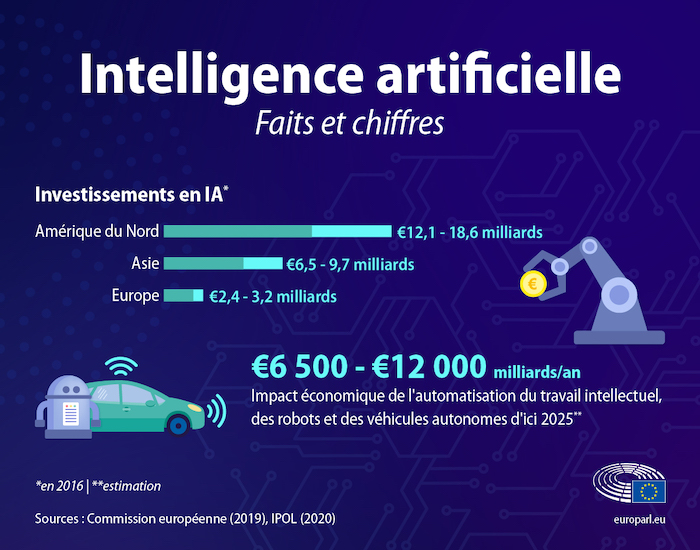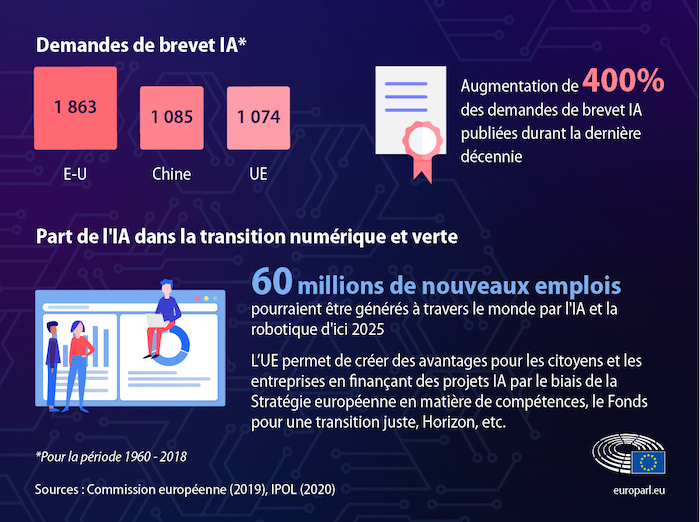
MEPs are currently working on legislation to be adopted around artificial intelligence (AI). Innovation, access to data, protection of citizens, ethics, research, legal, social and economic issues, the impacts of the future regulation are numerous and central for citizens, administrations and businesses alike. So what are the outlines of the EU legislation envisaged by MEPs on artificial intelligence? This is the question Parliament has answered.
Intelligence plays a major role in the digital transformation of our societies. It is now hard to imagine a life without AI and its presence in many goods and services. Future changes are on the horizon in the sphere of work, finance, health, safety, agriculture and many other sectors. AI also plays a central role in the Green Pact for Europe and the recovery from the Covid-19 pandemic.

The EU is preparing a first set of rules around the opportunities and risks of AI, to build confidence in AI and control its potential impact on individuals, society and the economy, while creating a favourable context for research, development and business. The Commission wants to stimulate private and public investment in AI technologies to reach €20 billion per year.
Ahead of the Commission’s proposal on AI, due to be presented in early 2021, Parliament set up a special committee on Artificial Intelligence in the Digital Age (AIDA ) to analyse the impact of artificial intelligence on the EU economy.
“Europe needs to develop an AI that is reliable, avoids discrimination or favouritism and works for the well-being of all, while ensuring the development of businesses and promoting economic prosperity,” said the president of AIDA, Dragoș Tudorache (Renew, Romania).
The Parliament also adopted three reports on 20 October, outlining how the EU can regulate AI in order to stimulate innovation and reliability of this technology, while setting ethical standards.

Members insisted that these rules must be human-centred. The report suggests ways to ensure safety, transparency and accountability in the sector, while avoiding favouritism and discrimination, promoting social and environmental responsibility and ensuring respect for fundamental rights.
“The citizen is at the heart of this proposal” said rapporteur Ibán García del Blanco (S&D, Spain) at a press conference.
Axel Voss (EPP, Germany), for his part, explained that the aim of the civil liability regime for artificial intelligence is to build trust by protecting citizens and promoting innovation by establishing a stable legal basis.
“We are not trying to create a revolution: there should be uniform rules for companies and the existing law should be taken into account”, he said.
As regards intellectual property rights, the Parliament stressed the importance of having an effective system to further develop AI, including patents and new creative processes. Among the outstanding issues are the problems of determining who owns the intellectual property of something developed entirely by AI, as rapporteur Stéphane Séjourné (Renew, France) pointed out.
Parliament is working on a range of other AI-related issues:
- JURI – civil and military uses of AI
- CULT – AI in the fields of education, culture and audiovisuals
- LIBE – Use of AI in criminal law
Translated from Quels sont les contours de la législation UE envisagée par les députés autour de l’intelligence artificielle ?









